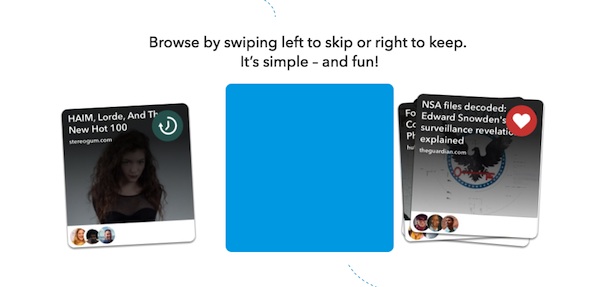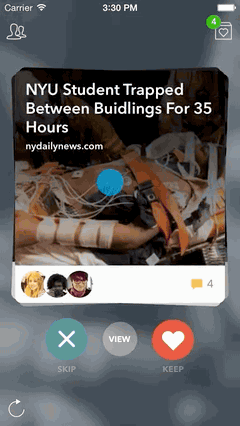
To understand what Potluck’s new iOS app will mean, you have to understand where Josh Miller thinks he went wrong with the first two tries.
Though the products have different names, Miller says the new app is really his third stab at the same idea — trying to build a platform that can improve the digital engagement and conversation space.
The first attempt was Branch, a company he cofounded with Hursh Agrawal and Cemre Güngör, and that was supported financially and otherwise by everyone from Jonah Peretti to Lerer Ventures to the founders of Twitter. “Our original hunch with Branch was, well, people aren’t tweeting and they aren’t blogging, even though they have opinions. Why is that?”
But what Branch actually ended up being was a way for publishers to curate digital expert panels. “A lot of people loved it, but the people that loved it were the people who were already used to creating content,” says Miller. It’s been used by everyone from The Atlantic to The New York Times to Al Jazeera, but Miller’s original goal eluded him. While Branch is still active, Miller says they’ve stopped designing new features for it in order to focus on Take Two.
“Branch was a dynamic where, if a Branch took off, it was all over the place — Twitter, Mediagazer, Hacker News — everybody knew about it. But if you looked at the number of people that used it everyday and were addicted to it, there was a very small number,” Miller says. “Potluck is the opposite. Potluck, you’ve probably never seen on Twitter, but there’s a significant community of people coming back four to eight times a day.”
Potluck, the frequently used analogy goes, was supposed to feel like a dinner party, a place where you could have intimate, interesting conversations with the people you know and people you might like to know. But there was a problem.
“We said, ‘This is going to be a great dinner party!’ And nobody showed up. Nobody brought food. It’s like, there’s nothing here,” says Miller. “Our goal with these snacks is that we think there’s a huge demand for a mobile application where you don’t have to wait for anything to load, where the content is easily digestible, where you can very quickly learn about what’s going on in the world while you’re taking a bathroom break or in line at the grocery store.”
“Snacks” are what Miller hopes will be the core attraction of the new app, Take Three: news stories condensed into three, swipeable cards.
 “Most people, when they’re on their phone, which they increasingly are, they really just want these quick hits. They don’t want a thousand words, or even 500 words. That’s what we see the snacks being. You get a title, we’ll give you three slides and then, if you find it interesting enough that you want to read deeper, we’ll link you to a third party that we think does a good job of giving you more information,” says Miller.
“Most people, when they’re on their phone, which they increasingly are, they really just want these quick hits. They don’t want a thousand words, or even 500 words. That’s what we see the snacks being. You get a title, we’ll give you three slides and then, if you find it interesting enough that you want to read deeper, we’ll link you to a third party that we think does a good job of giving you more information,” says Miller.
Although Potluck’s editors will be creating these content snacks in the beginning, Miller says he’d be open to outside publishers — and users — contributing as soon as possible. “We don’t consider ourselves a media company. We don’t want to consider ourselves a publisher,” says Miller. “We just think that’s very important for us to establish content in the community we want early on.” Commenting, the bet goes, will be better if there’s something built in to comment on.
What Potluck wants is to be the best commenting platform, the “best content and conversation experience” available in a native iOS app today. For Miller, that meant building an intimacy that the original Branch lacked. “Everybody is going to see the same content. What our editors create is what everybody in the app is going to read. But the conversation thread you see is only going to have your friends, and friends-of-friends,” he says. “It would be like if tomorrow Facebook said, ‘We’re launching a new iOS app and it’s called The News. And in The News, you only post links and articles and you talk to your Facebook friends about the news.’ It’s that, but with a smaller graph.”
Miller believes his credentials as a platform builder, plus his experience with Branch, make his team uniquely poised for success in the “fuzzy area” between content creators and tech startups. If media companies are already willing to farm out comments to third parties like Disqus, Miller believes Potluck has an opportunity to become the platform that’s “owning the engagement.”
“Most publishers, when they created a native app, not a lot of people downloaded them. So they said, ‘We’ll just create a nice mobile web view, so at least when it’s shared on Twitter and Facebook it will look good.’ That’s them thinking like a media company,” says Miller. “Products-focused companies will always be best at building those products, and content-focused companies are always going to be focused on creating the best content.”
As far as media tech companies go, Miller singled out BuzzFeed, Gawker, and (sister company) Medium as well as messaging apps like MessageMe, GroupMe and Kik. But the company that comes closest to swimming in the same waters as the new Potluck app is Circa, which also uses a card metaphor to tell news stories in a mobile context. Says Miller: “We’re similar in the sense that we both don’t want you to have to wait for a URL to load, and we think you need bite-size chunks at a time. In that sense, we’re both on the same page — but we still think content should be shorter.”
In other words, Miller believes that the audience looking for news that’s longer than a tweet but shorter than an article is being underserved. “There’s a little pie of people who are interested in reading a New York Times article on the shutdown,” he says. “We think there’s a much, much larger pie that is interested in the government shutdown but doesn’t find any of those articles that approachable.” Ultimately, he wants Potluck to offer just enough information to generate conversation.
Miller does have some plans for monetizing Take Three, although he readily admits that most of them are half-baked. Indeed, his suggestion that at some point premium Potluck content — industry-specific news, for example — might only be available to subscribers seems rather unlikely when you remember that we’re ultimately talking about three to five sentences, based on things reported elsewhere. That said, he did point out that, once upon a time, nobody thought people would pay 99 cents for iTunes music files when they could be downloading the same music for free.
“The reason people started doing it was, it was the fastest way to do it, it was easy, it was intuitive,” he says. “If Potluck is the quickest, easiest, fastest way to consume content, maybe there’s an opportunity to do something similar to what Apple did.”
But clearly, with its focus on content, advertising is the most likely route to revenue for the new app, although Miller says they have no immediate plans to hire a sales team. But Miller’s not interested in banner ads.
“You can imagine a world in which the top card is The New York Times with three slides on the government shutdown and the next is GE on why their new jet is going to be amazing,” he says. Although they have no plans to create video content, Miller said he hopes swiping cards, which he claims is “by and large, the most fun, addictive, mobile interaction,” will ultimately generate price points comparable to preroll ads for video content.
Says Miller: “I think it would be really interesting to say, ‘Hey Nike, make a snack about your new shoes and why they’re so awesome and we’ll put it in the stack with anyone that follows ESPN.'”
Potluck’s core challenge will probably still be getting people to use it. While there are undoubtedly users looking for a more intimate, faster, mobile platform for engagement, the barriers to conversion from Facebook, Twitter, or your social network of choice still seem high. Plus, call me an optimist, but Miller seems to be depending rather heavily on the assumption that New York Times content is too highbrow for most consumers.
That said, if neverending Internet chatter is to be believed, comments are something we still haven’t fixed. If Potluck manages to not only solve that problem, but do it in the mobile space, Miller might be on to something. As he says himself, if you don’t think “conversation as the core of content” is the next big thing, just look at how hard Nick Denton is focused on Kinja.
“Nobody wants to talk about news on Instagram. Nobody wants to learn about the government shutdown on Snapchat, because that’s where you’re trading selfies with your girlfriend or posting photos of the sunset,” Miler says. “I think the big play for publishers, or a tech company, is to try and become the place where you talk about this stuff. Whether it’s Potluck or Gawker or Curbed or Vox or whatever — or maybe it’s going to Facebook if they do a standalone app, or Twitter — I think there’s going to be a single platform where people talk about this stuff.”